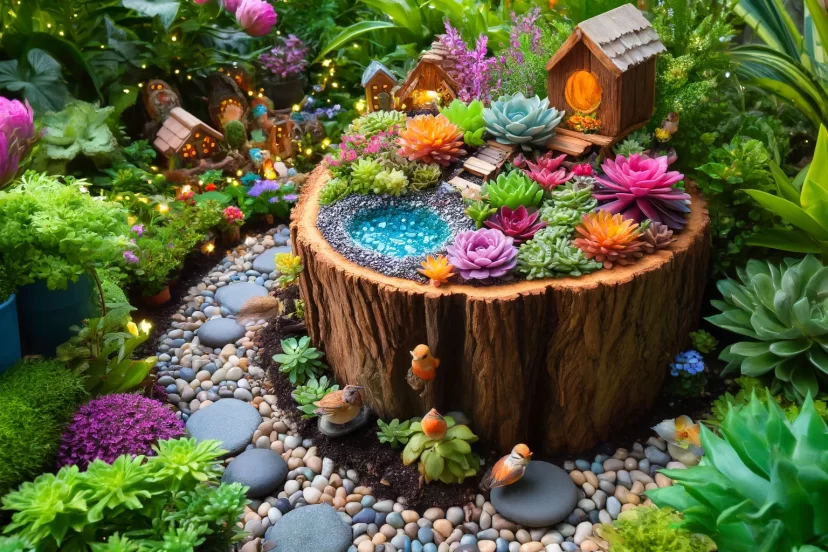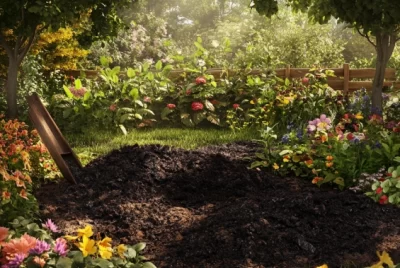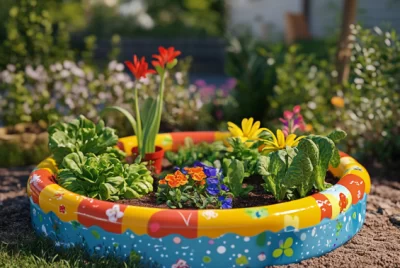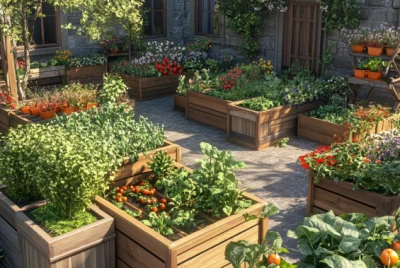Gardening Ideas For Tree Stumps
In this article, we’ll explore a variety of gardening ideas for tree stumps that can transform these remnants into beautiful and functional garden features. Tree stumps can be a challenge in any garden, but with a bit of creativity, they can become an asset rather than an eyesore. Whether you’re looking to add a unique planter, create a fairy garden, or even carve a piece of art, there are plenty of options to consider. Let’s dive into the benefits and some inspiring ideas to get you started.
Benefits of Using Tree Stumps in Gardening
Environmental Benefits
Reusing tree stumps in your garden is an environmentally friendly choice. Instead of removing and disposing of the stump, you can repurpose it, reducing waste. Tree stumps can also help to enrich the soil as they decompose, providing a natural habitat for various insects and microorganisms that are beneficial for your garden.
Aesthetic Appeal
Tree stumps add a rustic charm to your garden. Their natural look can complement various garden styles, from wild and whimsical to neat and structured. Using stumps creatively can make your garden stand out and give it a unique character.
Cost-Effectiveness
One of the best things about using tree stumps in your garden is that it’s a cost-effective solution. Instead of spending money on stump removal, you can use the existing stump to create something beautiful. This not only saves money but also adds value to your garden with minimal investment.
Gardening Ideas for Tree Stumps: Creative Planter Ideas
Succulent Gardens
Succulent gardens are perfect for tree stumps. These hardy plants require minimal maintenance and thrive in various conditions, making them an ideal choice for busy gardeners or those new to gardening.
Choosing the Right Succulents
When selecting succulents for your tree stump garden, consider varieties like hens-and-chicks, echeveria, and jade plants. These types are resilient and can adapt well to the unique environment provided by the tree stump.
Planting and Maintenance Tips
To create a succulent garden, hollow out a section of the stump to hold soil. Ensure there are drainage holes to prevent waterlogging. Succulents prefer well-drained soil, so a cactus or succulent mix is ideal. Water sparingly and place the stump in a sunny spot for best results.
Flowering Planters
Transforming a tree stump into a flowering planter can add a burst of color to your garden. Flowers can create a vibrant focal point and attract pollinators like bees and butterflies.
Best Flower Choices
Choose flowers that suit your climate and the amount of sunlight the stump receives. Marigolds, petunias, and pansies are great options for sunny spots, while impatiens and begonias thrive in the shade.
Seasonal Planting Guide
Plan your planting according to the seasons. For spring, consider tulips and daffodils. Summer is perfect for sun-loving blooms like zinnias and geraniums. In the fall, chrysanthemums and asters can provide lasting color. For winter interest, consider planting hardy perennials or even small evergreens.
Herb Gardens
Herbs are not only useful in the kitchen but also make great additions to tree stump planters. They are relatively easy to grow and can add delightful scents and flavors to your garden.
Culinary Herbs
Basil, rosemary, thyme, and oregano are popular culinary herbs that grow well in small spaces. They can be easily accessed for cooking and add a touch of greenery to your garden.
Medicinal Herbs
Consider planting medicinal herbs like lavender, chamomile, and peppermint. These herbs are known for their soothing properties and can be used in teas, salves, and other home remedies.
Incorporating these gardening ideas for tree stumps into your garden can turn a simple stump into a stunning feature. With a bit of creativity and effort, you can enjoy the environmental benefits, aesthetic appeal, and cost-effectiveness of these unique garden elements.
Gardening Ideas for Tree Stumps: Fairy Garden Concepts
Design Elements
Creating a fairy garden on a tree stump can be a magical addition to your yard. Start by imagining a tiny world filled with whimsical characters and miniatures. Use moss, small plants, and tiny pebbles to create pathways and landscapes. You can even build miniature houses using small twigs and stones, creating a charming and enchanting scene.
Miniature Plants and Accessories
Select miniature plants like dwarf ferns, baby’s tears, and small succulents that fit the scale of your fairy garden. Accessories such as tiny benches, fairy figurines, and small birdbaths can enhance the magical atmosphere. You can find these accessories at garden centers or craft stores, or even make your own from natural materials.
Gardening Ideas for Tree Stumps: Creating a Fungal Wonderland
Mushroom Varieties
Transforming a tree stump into a fungal wonderland can be both beautiful and beneficial for your garden. Mushrooms like oyster, shiitake, and reishi are great choices for growing on tree stumps. These mushrooms not only look fascinating but can also be harvested for culinary use.
Growing Conditions
To cultivate mushrooms on a tree stump, you need to ensure the right conditions. Drill holes into the stump and insert mushroom spawn plugs, then seal the holes with wax to keep the moisture in. Keep the stump in a shady, damp area to promote growth. Regularly mist the stump to maintain the necessary humidity levels.
Gardening Ideas for Tree Stumps: Wildlife Habitats
Bird Baths and Feeders
Tree stumps can be easily transformed into bird baths or feeders, attracting a variety of birds to your garden. To create a bird bath, carve a shallow basin into the top of the stump and fill it with water. For a bird feeder, attach a platform or bowl to the top of the stump and fill it with seeds. These additions will provide birds with a safe place to drink and eat, adding life and activity to your garden.
Insect Hotels
An insect hotel made from a tree stump can provide shelter for beneficial insects like bees, ladybugs, and lacewings. Drill holes of various sizes into the stump to create nesting sites. You can also add materials like bamboo, straw, and pine cones to attract different types of insects. These insects will help with pollination and pest control in your garden.
Gardening Ideas for Tree Stumps: Functional Uses
Outdoor Seating
Tree stumps can be turned into rustic outdoor seating. Simply smooth the top of the stump to create a flat surface for sitting. You can leave the stump natural for a more rugged look or sand and varnish it for a polished finish. Group several stumps together around a fire pit or in a garden nook to create a cozy seating area.
Table Bases
Another practical use for tree stumps is as bases for garden tables. Attach a wooden or glass top to a sturdy stump to create a unique and sturdy table. This can be a great addition to your outdoor dining area or as a side table in your garden, providing a natural and functional piece of furniture.
Gardening Ideas for Tree Stumps: Carving and Sculpting Ideas
Decorative Carvings
If you’re artistically inclined, consider carving decorative designs into your tree stump. Simple patterns, floral designs, or even more intricate images can transform the stump into a piece of garden art. Use chisels and other carving tools to etch your chosen design into the wood, creating a personal and beautiful feature for your garden.
Functional Art
Beyond decorative carvings, you can also sculpt functional pieces from tree stumps. Carve out a hollow to create a planter, or shape the stump into a birdhouse. Functional art not only enhances the beauty of your garden but also serves a practical purpose, blending aesthetics with utility.
Gardening Ideas for Tree Stumps: Lighting Options
Solar Lights
Integrating solar lights into a tree stump can create a magical ambiance in your garden. Place solar light stakes around the stump or embed small solar lights into the wood. These lights charge during the day and provide a soft glow at night, highlighting the stump and surrounding plants.
Fairy Lights
Fairy lights wrapped around a tree stump can add a touch of enchantment to your garden, especially in the evening. Choose weather-resistant fairy lights and weave them around the stump and nearby plants. The twinkling lights can create a whimsical and inviting atmosphere, perfect for evening gatherings or simply enjoying your garden at night.
Gardening Ideas for Tree Stumps: Maintaining Tree Stump Gardens
Pest Control
Keeping pests away from your tree stump garden is essential to maintaining its beauty and health. Regularly inspect the stump and surrounding area for signs of pests like termites or beetles. Use natural pest control methods, such as neem oil or diatomaceous earth, to keep unwanted insects at bay without harming the beneficial ones.
Rot Prevention
Preventing rot is crucial for the longevity of your tree stump garden. Ensure good drainage to avoid waterlogging, which can lead to decay. Applying a wood preservative or sealant can help protect the stump from moisture and fungal growth. Regular maintenance and monitoring will keep your tree stump garden in excellent condition for years to come.
Gardening Ideas for Tree Stumps: Case Studies and Inspirations
Real-Life Examples
Looking at real-life examples of tree stump gardens can provide inspiration and ideas for your own projects. Many gardeners have transformed old stumps into stunning features, from intricate fairy gardens to functional planters and seating areas. Explore garden blogs, social media, and gardening magazines to see how others have creatively used tree stumps in their gardens.
Reader Submissions
Encourage readers to share their own tree stump gardening projects. Creating a community of gardeners who exchange ideas and showcase their work can inspire others to try their hand at these creative gardening ideas. Sharing successes and learning from each other’s experiences can lead to even more innovative uses for tree stumps.
By incorporating these gardening ideas for tree stumps, you can transform a simple stump into a beautiful and functional part of your garden. Whether you’re creating planters, wildlife habitats, or even lighting features, the possibilities are endless. With a bit of creativity and effort, your tree stump can become a unique and valuable addition to your garden.
Gardening Ideas for Tree Stumps Conclusion
Tree stumps, often seen as obstacles, can be transformed into beautiful and functional elements of your garden with a bit of creativity. From planters filled with succulents, flowers, and herbs to whimsical fairy gardens and practical outdoor seating, the possibilities are endless. Not only do these gardening ideas for tree stumps add aesthetic appeal, but they also offer environmental benefits and cost savings.
We’ve explored various uses for tree stumps, including creating wildlife habitats, carving decorative and functional art, and incorporating lighting options to enhance your garden’s ambiance. By maintaining your tree stump gardens with proper pest control and rot prevention, you can enjoy these unique garden features for years.
Real-life examples and reader submissions highlight the endless possibilities and provide inspiration for your own projects. Embracing these creative gardening ideas for tree stumps can turn a simple stump into a standout feature in your garden, adding charm, character, and functionality.
So, the next time you encounter a tree stump in your yard, don’t see it as a problem to be removed. Instead, view it as an opportunity to create something beautiful and unique. With these ideas and a bit of imagination, your garden can become a true reflection of your creativity and love for nature. Happy gardening!
FAQs About Gardening Ideas for Tree Stumps
Q1: How do I prepare a tree stump for planting succulents?
A1: To prepare a tree stump for planting succulents, start by hollowing out a section of the stump to create a planter. Ensure there are drainage holes at the bottom to prevent waterlogging. Fill the hollow with well-draining soil, such as a cactus or succulent mix. Then, plant your succulents, spacing them out to allow room for growth. Water sparingly and place the stump in a sunny spot for best results.
Q2: What are some low-maintenance plants that work well in tree stump planters?
A2: Low-maintenance plants that work well in tree stump planters include succulents (like hens-and-chicks and echeveria), hardy herbs (such as thyme and oregano), and resilient flowers (like marigolds and petunias). These plants require minimal watering and can thrive in the well-draining soil typically used in stump planters.
Q3: How can I turn a tree stump into a bird bath?
A3: To turn a tree stump into a bird bath, carve a shallow basin into the top of the stump. Ensure the basin is wide and shallow enough to accommodate small birds. Smooth the surface to prevent splinters and fill the basin with water. You can also place a removable shallow dish or bowl on top of the stump for easier cleaning and maintenance.
Q4: What are some ways to prevent my tree stump garden from rotting?
A4: To prevent your tree stump garden from rotting, ensure good drainage by avoiding waterlogging. Apply a wood preservative or sealant to protect the wood from moisture and fungal growth. Regularly check the stump for signs of decay and remove any rotting parts promptly. Keeping the stump dry and well-ventilated will help prolong its life.
Q5: Can I grow mushrooms on a tree stump? If so, how?
A5: Yes, you can grow mushrooms on a tree stump. To do this, drill holes into the stump and insert mushroom spawn plugs. Seal the holes with wax to retain moisture. Keep the stump in a shady, damp area and mist it regularly to maintain the necessary humidity levels. Oyster, shiitake, and reishi mushrooms are great varieties to grow on tree stumps.




